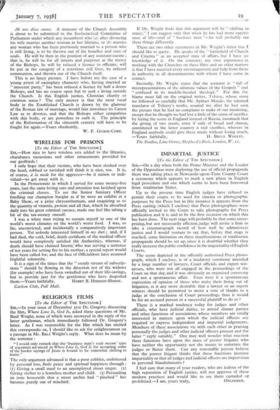RELIGIOUS FILMS [To the Editor of THE SPECTATOR.]
Snt,—In your issue of December 31st Dr. Gregory, discussing
the film, Where Love Is, God Is, asked three questions of Mr. Basil Wright, none of which were answered in the reply of the latter gentleman, which immediately followed Dr. Gregory's
letter. As I was responsible for the film which has excited this correspondei ce, I should like to ask for enlightenment on a passage in Mr. Basd Wright's reply. What does he mean by the sentence :
"I would only remark that the business man's wade mecum' type of argument advanced in Where Love Is, God Is for accepting some of the harder sayings of Jesus is bound to be somewhat chilling to many."
The only argument advanced is that a poor cobbler, embittered by personal loss, finds peace and spiritual happiness through : (i) Giving a small meal to an unemployed street singer. (2)
Giving shelter to a homeless mother and child. (3) Persuading an irate housewife that a street urchin had " pinched " her• bananas purely out of mischief. If Mr. Wright finds that this argument will be " chilling to many," I can suggest only that when he has had more experi• ence of life—and of " business men "—he will probably see these things differently.
There are two other statements in Mr. Wright's letter that I should like to query. He speaks of the " battlefield of Church and Cinema " as an accepted state of affairs, but I have no knowledge of it. On the contrary, my own experience in working with the Churches on these films and on other matters is that I have received every encouragement and help from those in authority in all denominations with whom I have come in contact.
Secondly, Mr. Wright states that the scenario is " full of misrepresentations of the ultimate values of the Gospels " and " confused in its muddle-headed theology." For this the blame must fall on the original writer, Tolstoy, whose story we followed so carefully that Mr. Aylmer Maude, the talented translator of Tolstoy's works, assured me after he had seen the picture that he had no complaint to make of our rendering, except that he thought we had lost a little of the sense of sacrifice by laying the scene in England instead of Russia, inasmuch that the giving of two meals, even if only of bread and cheese, constituted in the latter country a real sacrifice, whereas in England anybody could give these meals without losing much.









































 Previous page
Previous page